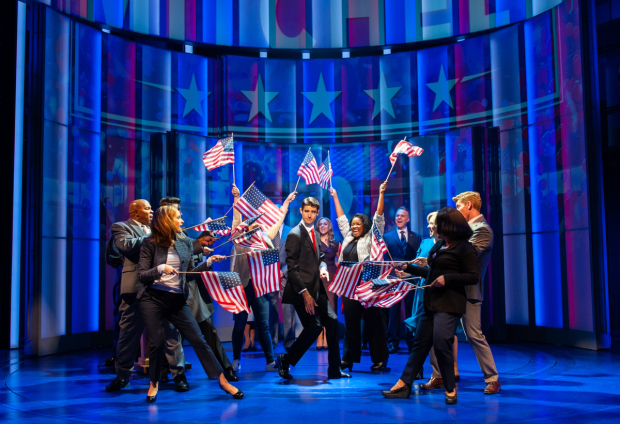Dave Offers an Inspiring, Idealistic Political Fantasy
Drew Gehling and Mamie Parris star in this new musical adaptation of the 1993 film at Arena Stage.

(© Margot Schulman)
If you think the words "political" and "comedy" should never be found in the same sentence, you owe yourself a trip to Arena Stage, which is currently mounting the world premiere of the musical Dave. Thomas Meehan and Nell Benjamin provide the book for this adaptation of the 1993 film of the same name, with Benjamin's clever lyrics ingeniously illuminating Tom Kitt's upbeat pop-rock music. The show proves beyond a shadow of a doubt that the shenanigans of selfish politicians can be addressed through humor that uses everything from barbed criticism to scathing satire to make a valid argument against wicked pols.
Dave tells the story of an idealistic young man, Dave Kovic (Drew Gehling), who is a high school American history teacher. Dave happens to look just like Bill Mitchell, the President of the United States (also played by Gehling). When he is contacted by the Secret Service and asked to stand in for Mitchell one night just to wave at crowds, Dave is intrigued. But when the President slips into a coma while Dave is impersonating him, Dave needs to be talked into playing the role a bit longer. Worst of all, he needs to contend with Mitchell's evil chief of staff (Douglas Sills), who really wants to be President himself.
Unlike the egomaniacal President, who cares nothing for Americans, Dave is an altruist and actually enjoys doing things that help people. He and first lady Ellen Mitchell (Mamie Parris) visit a nursing home, where Dave becomes convinced of the need for elder care, which leads him to find a way to fund it in the national budget.
Gehling is wholly credible in the scenes where he plays the heartless president as well as the scenes where he plays the affable Dave. With his charm and light, clear tenor voice, he transmits his idealism without making the musical sound sappy. Parris appears first as the epitome of an angry woman who has given up on her philandering husband. Her powerful soprano in a duet with Dave ("The Last Time I Fake It") exhibits Ellen's disgust with the phony life she shares with Mitchell. But from the moment she realizes that Dave is not her husband, Parris skillfully shows Ellen quickly falling for Dave.
The chief of staff's role is critical, as he presents a threat to Dave throughout the musical. Sills embodies that threat most potently in the number "Kill That Guy," which he dances with a chorus of black-clothed Secret Service men and women. Dave's constant companion is a Secret Service man, Duane (Josh Breckenridge). Although he rarely speaks, Duane is allowed to reveal his take on Dave's situation in a brilliant rendition of "Not My Problem." Bryonha Marie Parham is forceful in the pivotal role of Mitchell's communications director.
Much of the success of "Dave" can be attributed to director Tina Landau and choreographer Sam Pinkleton, who start the musical off at a lively pace in a scene in Dave's history class, and sustain that pace through the show. Set designer Dane Laffrey uses large transparent circular panels to establish different scenes. The panels are moved by actors — sometimes clockwise, sometimes counterclockwise — and minimal pieces are added to create different locales. Projection designer Peter Nigrini creates labels to identify those locales: Lincoln Bedroom, First Lady's Bedroom, and so on. Appropriately for a musical set in an unspecified time, Toni-Leslie James's costumes are modern without being attached to a particular year. Her attention to detail is acute: Dave, for instance, wears casual clothes when he is a teacher and trim suits once he is President. Music director Rob Berman directs an eight-member orchestra hidden behind scrims on both sides of the stage.
Dave is not intended to be a critique of any person or political approach. Instead, it is a fantasy of what it might be like if a truly good everyman united the country. Dave may just be a fairy tale, but it also has the power to remind theatergoers what it means to unite as Americans — if only for one night, if only as an audience.








